#pop culture criticism
Explore tagged Tumblr posts
Text
Absolutely banging essay by Maureen Ryan on the miracles Charisma Carpenter wrought as Cordelia Chase and what that cost her.
I’ve tried to write this essay for a decade. I have written so many versions of it. I don’t know if I cracked the formula. I do know, now, that it’s not about the man. It never was. I want to talk about the woman. The women. Who are not perfect, who are messy, angry, funny, brave. Through the lens of one woman who had to forge through the unknown, with so much pressing on her from all sides.
10 notes
·
View notes
Text
Franchises will never die
youtube
@themousefromfantasyland @the-blue-fairie @thealmightyemprex
2 notes
·
View notes
Text
@amalthea9 @princesssarisa @angelixgutz @themousefromfantasyland @the-blue-fairie @professorlehnsherr-almashy @inevitablemoment @thealmightyemprex @tamisdava2 @the-gentile-folklorist
“don’t reduce this female character down to a love interest” does not translate into “this female character shouldn’t have a love interest.”
preventing female characters with strong, compelling narratives from experiencing love, intimacy, and affection is just as regressive as reducing them down to sexual accessories for male characters. it assumes that women must choose between a romantic interest and depth of character and ignores a far more productive message: that women are capable of possessing both.
87K notes
·
View notes
Text
LORE | REKINDLED EPISODE 59 - GOING UP

























Previous episode | Next episode
Getting to re-invent the elevator scene from S1 was super fun, especially with the accompaniment of Persephone; I always enjoy writing their back-and-forths, it very much plays to my own writing interests and strengths :'3 Thanks so much for reading! <3
----
Come join the discussion in our Discord!
The time lapse for this episode is coming soon to Patreon!
Watch me draw the next episode on Twitch
#lore rekindled#lore rekindled update#lore rekindled comic#lore olympus rewrite#lore olympus redraw#anti lore olympus#lore olympus critical#lo critical#also if anyone gets the super obscure pop culture reference i put in this then you officially qualify for a veteran's discount#if you know you know
751 notes
·
View notes
Text
cassandra & clytemnestra
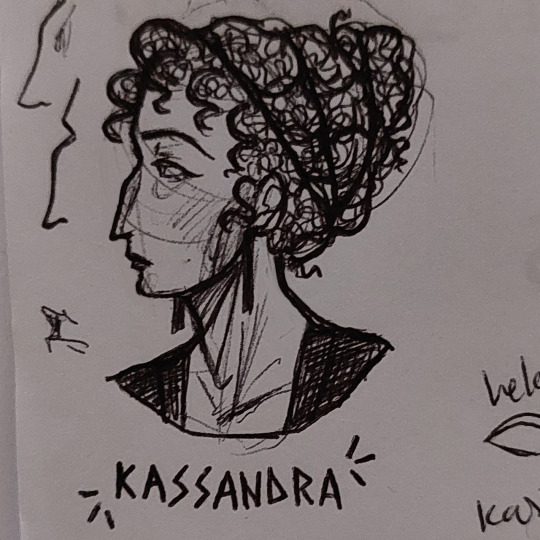
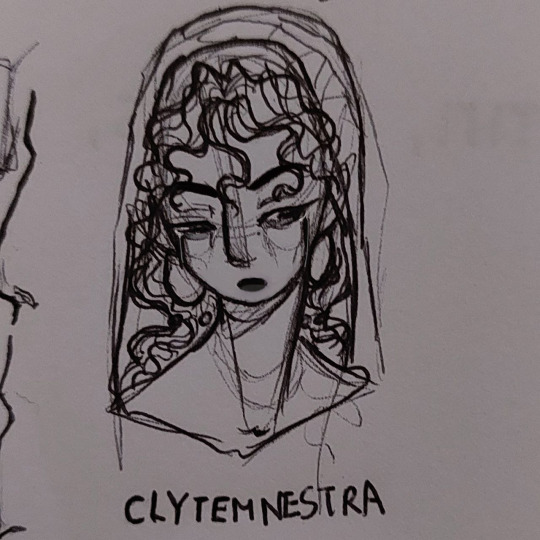
class doodles <3
cassandra: super proud of how she turned out!! i love noses so much and ive managed to give her a really glorious one today. she got a few compliments too hehe
clytemnestra: idk how well ive managed to depict it lol but cly is both mourning iphigenia and planning out her vengeance. its going to be a long 10 years but she will have her killers blood.
--
i still have a long way to go till i finish the iliad so i dont know everyones story yet, i do know however that cly like many before and after her arent often portrayed with the complexities that make them them, that make them human, but instead as paragons or pariahs. and i think theres lots to be said on the matter, but i dont want to get ahead of myself lol. anyway enjoy :D
#cassandra#cassandra of troy#kassandra#greek mythology#paris the musical#the iliad#my muffin#i love her so much#yall dont even know#clytemnestra#tragic mother figures of the mythos#they could never make me hate you#as i understand it she neglected her kids in favour of iphigenia. which isnt great parenting#so she isnt free of sin#and yet between her and agamemnon its quite clear who ruined more lives.#or is it?#(or is it?)#jokes aside lol#im still reading & learning but there seems to be a big divide between the mythos and modern perception#influenced by pop culture and adaptations sure but also a lack of critical thinking and the innitative to go fact check for oneself#which is several essays on its own lol#kinda lost where i was going with this :')#✨nuance✨#and go read the source materials pls#godbless#my art#my ramblings#everyone is entitled to their opinion#this is (part of) mine#pls feel more than free to share ur own thoughts and stuff
109 notes
·
View notes
Text
Academy Award Nominee Cynthia Erivo 🥹






British Academy Film Awards Nominee
Critics Choice Award Nominee
Golden Globes Award Nominee
Screen Actors Guild Award Nominee
#cynthia erivo#ariana grande#jon m chu#jon chu#iconic#pop culture#my posts#theblvcksupreme#posts#melanin#gay#lgbt#my stills#stills#Oscar’s#academy awards#golden globes#critics choice awards#sag awards#bafta awards#critical role#bafta#severance#elphaba thropp#wicked elphaba#Grammys#Harry Potter#911 abc#wicked#wicked movie
47 notes
·
View notes
Text
@the-blue-fairie @isareadsandwatches
People will spend hours watching "ending explained" videos and reading about how Ed, Edd, n Eddy is set in purgatory or some such barmy nonsense, but the moment you tell them a piece of media was motivated by racism or corporate interest in affecting public opinion or the Pentagon's funding suddenly you're reading too much into it.
70K notes
·
View notes
Text
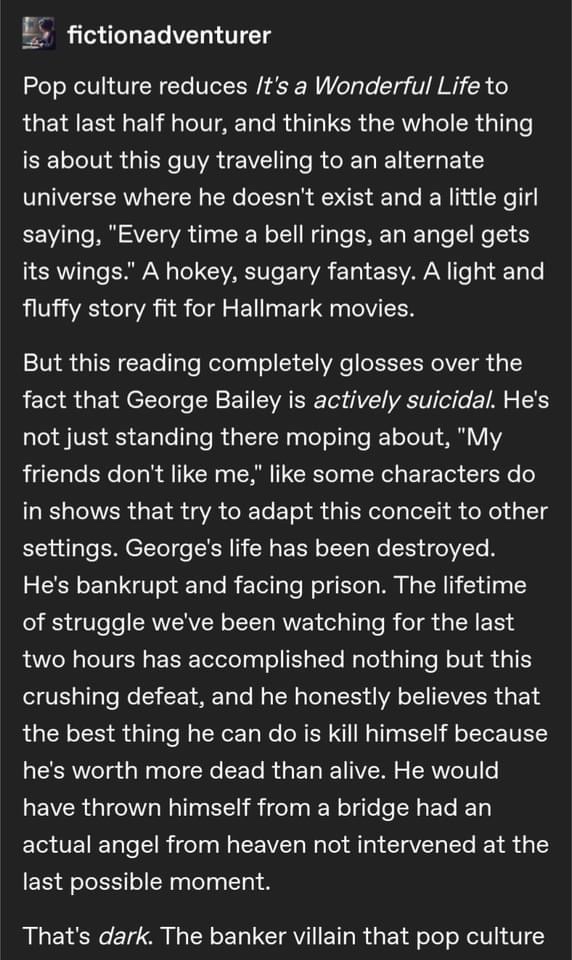
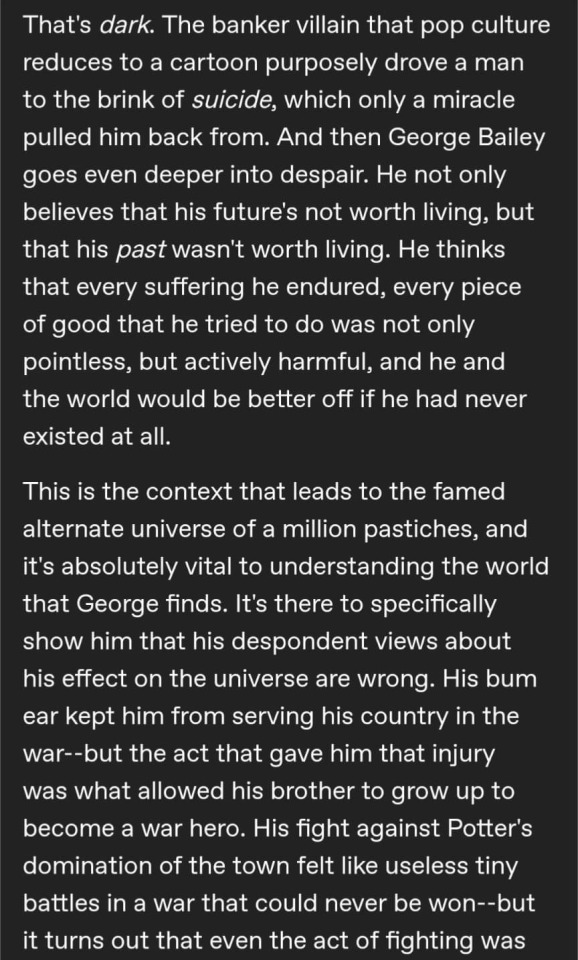
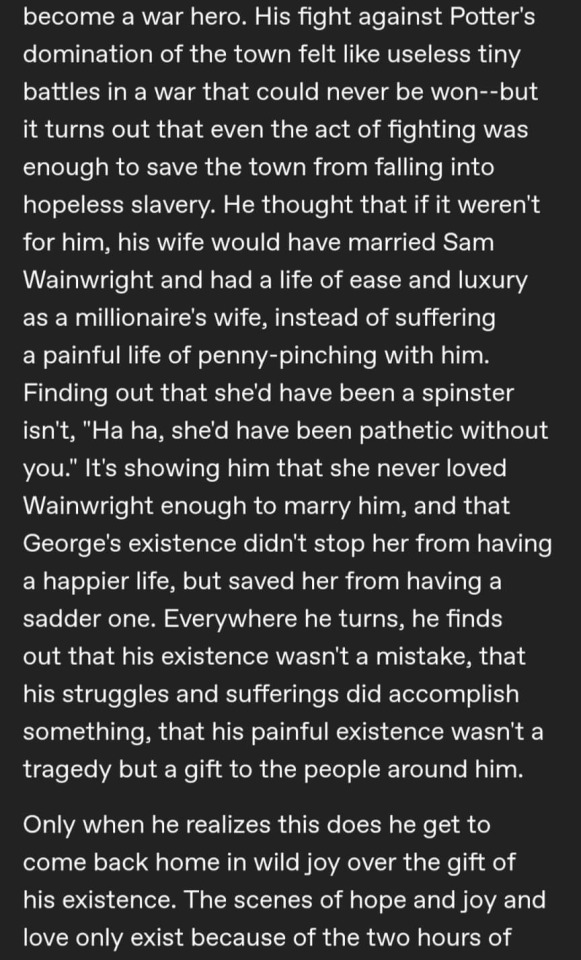
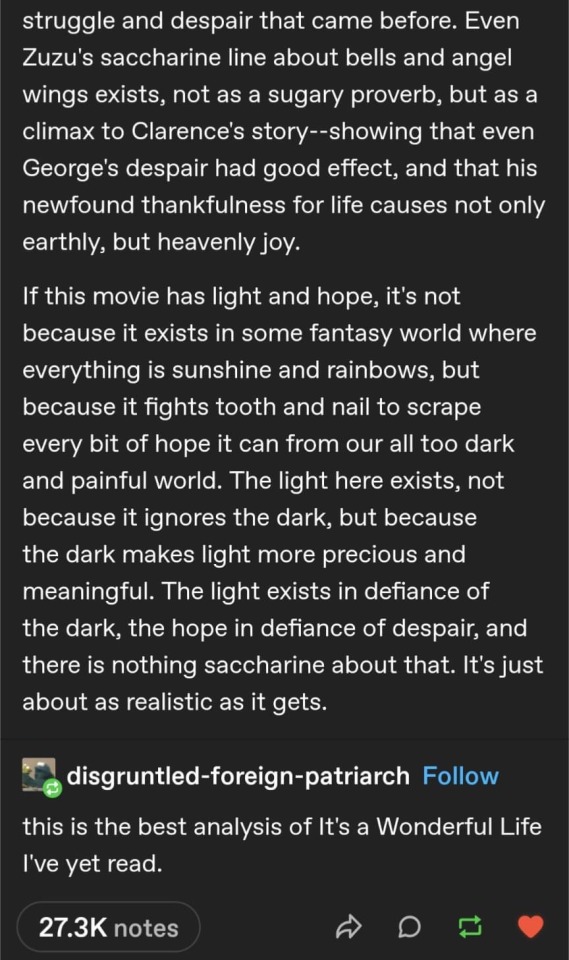
YES.
ALL OF THIS.
THIS is why this film still hits so hard after all these years.
It’s not some sugary BS about “you can think yourself out of suicidal depression by just learning to appreciate what you’ve got”.
It’s about the fact that people who work really fucking hard for their communities experience active, targeted, criminal pushback from exploiters.
About the fact that caring, in all its manifestations, is incredibly physically and mentally taxing and is often done by disabled people - YES, George Bailey is a disabled protagonist. His impairment prevents him from military service and actively causes him chronic pain that, as a person who lives with it, *will* affect his energy levels and fatigue constantly.
Notably, IAWL actually has a bunch of disabled characters. Not only is George disabled, but I’d put money on his uncle who loses the money being ADHD and very possibly having other learning disabilities and the film *actively* flagging that fact to the audience, even if it doesn’t necessarily know what ADHD is.
Which casts a whole new light on its principal villain being disabled. Instead of Old Man Potter being a flat caricature of “disability = evil”, what he *actually* is is a fantastic example of the fact that marginalisation in one axis does not prevent someone being an active oppressor - and wealth and class privilege, in particular, tend to mean a person actively acting to oppress other people who share their marginalisation in order to privilege the interests of their own class as a whole. Sometimes even damaging their own individual interests to do so.
It’s also super interesting that the *material* miracle in the film is not the appearance of an angel to show George what life would have been like if he had never existed, but the *community solidarity* that saves him from jail and his family from penury. The supernatural intervention can change his *mindset*, and that is *incredibly* important, given it *literally* stops him killing himself, but the *material* intervention is mutual aid from his own community that he has given so much to.
Which is incredibly radical as a message. It’s not saying “faith is worthless”; it’s saying “faith can be an incredibly important factor in creating resilience in moments of despair, but we can’t, and *need not*, wait for a supernatural miracle to save us; we have the capacity to save ourselves and each other in our hands right now”.
#it’s a wonderful life#film criticism#disability#disability in media#mutual aid in media#george bailey#wow I know I liked it’s a wonderful life but apparently my feelings are way stronger than I appreciated#why I fucking hate sugary reductionism in pop culture sometimes#fuck I love this movie#disability in film
358 notes
·
View notes
Text
I have such conflicted feelings about the butch/masc dichotomy. I identify as a stone cold butch dyke. My partner identifies as masc, doesn't care much about labels. But to me? She's as much if not more "butch" than me. She balances masculinity and femininity with such prowess, as if it were fucking breathing. I prefer the term butch, by a lot, but I also understand why some people don't feel comfortable with it. There is so much stigma and there are so many people telling you HOW to be butch the right way, what is and isn't butch. It's easy to feel like you don't measure up, and it's easy to feel excluded, and I don't want anyone to feel that way. I AM a butch, but I extend solidarity to all dykes, regardless of how they choose to label themselves, even if I don't get it.
#dykeposting#lesbian#quinn brain soup#butch lesbian#masc lesbian#butch dyke#butch4butch#idk if this makes sense#and its not to say that i have zero criticism for how the term masc is used in pop culture#i have many thoughts#not to mention the way people view butch and femme as inseparable#resulting in butch4butch exclus individuals being left in shambles on how to define their butchness#wlw textpost#nblw textpost#nblw#dyke
50 notes
·
View notes
Text
@thealmightyemprex @the-blue-fairie @themousefromfantasyland
"This anxiety about surrendering a beloved franchise to a new generation of fans with different perspectives and values is also reflected in Doctor Who fandom. Recently, Doctor Who Magazine made the controversial decision to appoint a new “Time Team” of reviewers to analyse the classic series. This prompted a lot of preemptive anxiety from older fans, with many taking to social media with threats of a boycott. Naturally, things exploded when these young reviewers acknowledged the self-evident fact that beloved serial The Talons of Weng-Chiang was horrifically racist. Even the magazine’s editorial lambasted them.
There is something disappointing in all of this. One of the best things about fandom is the way that it is passed on like a baton from one generation to the next, and the way in which that generation are allowed to find their own own way. The archetypal memory for many Star Wars fans is going to see the original trilogy with their parents. Many modern Doctor Who fans might have relatives who remember the classic series. The James Bond film franchise also spans generations, and it’s entirely possible for two generations of any family to have grown up with different iterations, having their own preferences.
My own fandom is rooted in this experience. I inherited my love of Star Trek from my grandmother, who loved the original Star Trek and The Next Generation. However, she never appreciated Deep Space Nine. Indeed, my decisions to press ahead with Deep Space Nine on my own and to reach my own conclusions about it were a massive part of my fandom. Similarly, I inherited my love of horror from my grandfather, who showed me wonderfully inappropriate movies at a young age. He loved Wes Craven and John Carpenter, as did I. However, I had to branch out to The X-Files on my own.
I always considered this an important part of my fannish experiences, and I never begrudged my grandparents for holding slightly different tastes than I did. I’d have similar experiences with people that I introduced to my favourite things; their tastes would inevitably grow and develop in directions that reflected their own interests. They would branch beyond my taste and cultivate their own fandom that overlapped with mine by was also distinct in its contours. This never bothered me or unsettled me, and I never resented these people for that fact. I always saw it as an important part of sharing something; realising that it doesn’t belong entirely and completely to you.
3 notes
·
View notes
Text
@isareadsandwatches
There is a streak of anti-intellectualism when it comes to talking about films, and it's one of my biggest pet peeves. People are seemingly completely incapable of distinguishing between "what happened in the film" and "what the film is ABOUT."
To cite one of my favorite examples, The Shape of Water is not ABOUT a woman who fucks a fish, it is ABOUT people who are otherized by society finding comfort and beauty is what others see as their flaws. It is a beautiful film, that deserved all the praise and accolades it got.
Joker is not ABOUT mental health. It is a shallow film that uses mental health in a trivial way as a catalyst for its character's mental breakdown. Its refusal to be ABOUT anything is its greatest failure. Arthur stumbles his way into accidentally starting a riot, he admits politics do not interest him, and the concerns of those rioting are not addressed because that's not what the film is interested in. It tries to use all the right buzzwords to fake being deep, but in the end, winds up saying nothing interesting.
Annihilation is not ABOUT women going into an alien environment and experiencing wacky shit, it's about dealing with trauma, and deciding whether to let it consume you, or whether to move on.
Shit like this is why Qanon was so easily able to direct the conversation around Cuties. The director wanted to make a film about exploitation and female agency, but people are unwilling to engage with theme, they only care about surface-level shit. People took one look at the marketing, and decided they already knew what the film was about, and Qanon was able to use that to whip up a moral panic, and get people to harass the director and any critic with positive things to say about the film.
I still see social media making fun of English teachers for asking us to engage with a text beyond what's on the surface, but I think those are valuable skills when it comes to how we interact with art.
Popular YouTube channels like CinemaSins and Nostalgia Critic, which have made their anti-intellectualism into their whole careers, do not help in this regard.
6K notes
·
View notes
Text
Any time I see someone be like All music is bad now it’s all about tiktok trends spotify radio billboard charts pitchfork RYM it’s all soulless and homogeneous and tame subculture is dead genre is dead I’m just like . This is quite literally a skill issue. You’re just admitting that you don’t know how or are not trying to find anything more obscure than the stuff that’s trending or being algorithmically handed to you. You understand that right. Like there is music out there beyond what 17 y/os on tiktok are recording themselves dancing to in cosplay or what youtube reviewers are making videos about. Subculture exists in the real world in underground more-often-than-not predominantly marginalized communities that are thriving outside of the realm of what’s trending on social media or what’s being sold by fast fashion retail stores. Oftentimes because the hot spots of genuinely boundary pushing underground subculture are literally illegal. You not knowing it exists doesn’t mean it doesn’t exist. You know this. right.
#& like as always that’s not to say you can’t or shouldn’t criticize mainstream popular culture like. of course.#but imo it is a world of difference to criticize mainstream pop culture vs suggesting that There Is No Subculture#and very much imply if not state outright that all there is now is whatever is being spoonfed to you via algorithm lol…#like ‘this thing is bad’ and ‘this thing is all that exists’ are just. not the same criticism. shouldn’t even need to be said.
73 notes
·
View notes
Text
In this episode we explore a relatively new subgenre of science fiction called Solarpunk, which aims to imagine better, more ecologically harmonious, futures on earth. In many ways Solarpunk is a reaction to both the real-world climate crisis and to the many apocalyptic visions of collapse filling our screens. Andrew Sage from the YouTube channel Andrewism joins host Jonathan McIntosh and friend of the show Carl Williams for this conversation.
References & Links • The Andrewism YouTube Channel • Walkaway by Cory Doctorow • Ecotopia by Ernest Callenbach • Sunvault: Stories of Solarpunk and Eco-Speculation • Fighting for the Future edited by Phoebe Wagner • Parable of the Sower by Octavia Butler • Princess Mononoke from Studio Ghibli • The Ones Who Walk Away from Omelas by Ursula K. Le Guin • Emergency Skin by N. K. Jemisin • Monk and Robot book series by Becky Chambers • Dear Alice from THE LINE • Dear Alice’ Decommodified Edition by Waffle To The Left • Our History Is the Future by Nick Estes • 3000-Year-Old Solutions to Modern Problems by Lyla June • Capitalist Realism by Mark Fisher
#Solarpunk and How We Escape Dystopia#pop culture detective#pop culture#solarpunk#solar punk#podcast#podcasts#cultural criticism#cultural critique#movies#film#tv#books#literature#corporate media#climate crisis#environmental activism#activism#collective action#water protectors#land back
267 notes
·
View notes
Text
The Way We Talk About Art Is So Weird Now
We, as a culture, reward effortlessness. Look at who we platform, when and how they’re presented. Art icons arrive fully formed. Rarely do we see their infancy, the time spent reading books and articles, visiting museums, etc. In other words, developing their taste and acquiring a level of expertise.

We don’t see any of that. They blossom before us as beautiful flowers, the roots which harbor the actual work buried deep in the dirt.
More people want to fast forward, to somehow blossom without the root. But the only flowers that can do that are fake, cheap, plastic. And you can tell just by looking at them!
However, perhaps even more dreadful, people simply don’t care. The fake flowers are treated as though they are just as valid as the real thing. But they’re not. And the more I see this attitude permeate online discussion of various art forms, the more concerned I become.
In this post, I discuss the weird way we talk about fashion, music, personal style, modern art, and books. I also explain why yes, it is that deep. Click below to read! :)
#not paywalled or anything like that#feedback welcome#:D#substack#writing#my writing#art#article#music#fashion#personal style#books#booktok#cultural criticism#pop culture#modern art#stan twitter#deep dive#anti intellectualism
22 notes
·
View notes
Text
Honestly, we need better, more thought-provoking, intersectional discourse. And for that to happen, people need to stop picking at the lowest hanging fruit or focusing on spectacle and get to the actual issues. People need to be able to fathom that multiple ideas can co-exist at the same time, that 2 or more things can be true or false simultaneously.
Mm... the discourse is lacking these days. Nothing annoys me more than bad public discourse.
9 notes
·
View notes
Text
How Star Wars led to Reaganism
Found some interesting articles from historian Rick Perlstein about how movies like SW, Superman and Rocky helped push America to right wing politics. While Lucas did include some left wing, anti Vietnam war themes and aesthetics in his movies, that wasn’t how most Americans interpreted them. Americans identified with the rebels as the underdog. It being a black and white whimsical fairy tale with a lack of moral nuance during a decade of morally grey films that came after Vietnam and Watergate appealed to those who would vote for Reagan. It would have an affect on pop culture and the movies that were made after. Movies of the 80s like Back to the Future and Indiana Jones continued the trend of whimsical, special effects filled movies during the Reagan era. Should people really be surprised at the news of Spielberg being a Zionist when a lot of his films are conservative?
I feel like people shouldn’t be surprised at this or why there’s a lot of conservatism in the SW fandom as it’s there in the story too. There’s a lot of sexist and racist tropes in the franchise from the Tusken raiders, The Bad Batch and how Han and Anakin treat their love interests. Most of the villains are just evil for the evulz with even the more sympathetic villains being made out to have done it to themselves. Contrary to what some say, Lucas intended the Jedi to be entirely in the right and puts the blame entirely on Anakin for his fall. That’s a fairly conservative way of thinking that puts all the blame on the individual for being tempted or “lazy” as opposed to looking at systemic, psychological and child rearing issues and how they influence people. Star Wars is a very moralistic religious story. It has some left wing themes but is very conservative with its black and white morality and people shouldn’t be as shocked by the existence of right wing fans as they are.
#star wars#star wars critical#anti star wars#ronald reagan#rick perlstein#fuck reagan#us politics#george lucas#steven spielberg#pop culture#us history#conservatives#This will ruffle some feathers#anti zionism#star wars fandom#Don’t know if this fits but#jedi critical#Robert zemeckis
49 notes
·
View notes